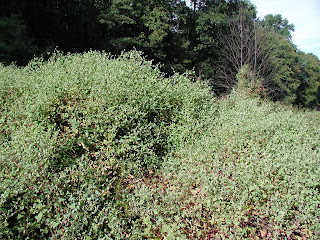 |
| Mile-a-minute vine. Photo by Dave Jackson |
An Act that
will regulate controlled plants and noxious weeds (Controlled Plant and Noxious
Weed Act) has been introduced to the House (HB 790) by Rep. Pashinski et al.
and Senate (SB 567) by Senator Argall et al. Both Bills have been referred to
the respective Agriculture and Rural Affairs Committees. The new Act would
replace the current Noxious Weed Control Law that has been in place for
decades.
The new Act
will modernize PA's noxious weed law by prioritizing invasive plant management
based on the ability to effectively contain or even eradicate certain species.
In addition, it will help build awareness of problem weed species that require
proactive attention. Now is a great time to let your House and Senate
representatives know what you think about this new legislation on noxious
weeds.
The new Act groups plants into three
categories;
Class A: weeds are currently
geographically limited in the Commonwealth and are intended to be eradicated if
at all possible. Kudzu and giant hogweed are good examples of Class A weeds.
Two new invasive pigweeds (Palmer amaranth and waterhemp) are included as Class
A weeds in the new Act. Palmer amaranth is currently a noxious weed in
Delaware, Ohio, and Minnesota and is under consideration in several other
states.
Class B: weeds are widely established
in the Commonwealth and it is not feasible to eradicate them. Although they are
still important, limited resources must be focused on the species that will
maximize impact. Canada thistle and multiflora rose are examples of Class B
weeds.
Class C: weeds pose a potential threat
if introduced, but currently are not known to exist in the Commonwealth. A
number of Federal noxious weeds are Class C weeds.
What would the new noxious weed law mean to
PA?
First and
foremost, it would provide increased awareness to recognize that certain weed
species are a big problem. Class A weeds will require proactive management and
this will help direct educational efforts. Proactive management reduces the
chance of movement and introduction onto your farm or in your area.
There are
costs associated with monitoring and managing noxious weeds. With the invasive
pigweeds, PA imports unwanted seed through other commodities and equipment.
This will require additional quality control measures for feed, seed, and
forage producers. The seed industry will need to evaluate seed sources, making
sure they have a quality product that does not contain noxious weed seed.
Custom
equipment operators will need to be diligent about where they operate and about
cleaning equipment if they encounter a contaminated farm. Farm supply and
export enterprises need to be part of the solution to ensure that noxious weeds
are not transported or spread within or out of the state. In the end, the new
Controlled Plant and Noxious Weed Act can help to protect the productivity and
profitability of the Commonwealth and position PA as a leader among other
states regarding proactive weed management.
No comments:
Post a Comment